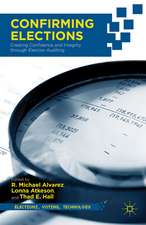Prototype Politics: Technology-Intensive Campaigning and the Data of Democracy: Oxford Studies in Digital Politics
Autor Daniel Kreissen Limba Engleză Paperback – 27 iul 2016
| Toate formatele și edițiile | Preț | Express |
|---|---|---|
| Paperback (1) | 260.44 lei 10-16 zile | |
| Oxford University Press – 27 iul 2016 | 260.44 lei 10-16 zile | |
| Hardback (1) | 630.60 lei 31-37 zile | |
| Oxford University Press – 28 iul 2016 | 630.60 lei 31-37 zile |
Din seria Oxford Studies in Digital Politics
- 8%
 Preț: 172.74 lei
Preț: 172.74 lei - 18%
 Preț: 172.74 lei
Preț: 172.74 lei - 11%
 Preț: 124.04 lei
Preț: 124.04 lei - 8%
 Preț: 155.19 lei
Preț: 155.19 lei - 14%
 Preț: 186.82 lei
Preț: 186.82 lei - 13%
 Preț: 127.32 lei
Preț: 127.32 lei -
 Preț: 320.09 lei
Preț: 320.09 lei - 14%
 Preț: 190.59 lei
Preț: 190.59 lei - 14%
 Preț: 132.79 lei
Preț: 132.79 lei - 13%
 Preț: 140.87 lei
Preț: 140.87 lei - 14%
 Preț: 125.88 lei
Preț: 125.88 lei - 12%
 Preț: 129.91 lei
Preț: 129.91 lei - 9%
 Preț: 170.95 lei
Preț: 170.95 lei - 19%
 Preț: 190.50 lei
Preț: 190.50 lei - 13%
 Preț: 239.11 lei
Preț: 239.11 lei - 13%
 Preț: 113.15 lei
Preț: 113.15 lei - 12%
 Preț: 158.31 lei
Preț: 158.31 lei - 22%
 Preț: 180.44 lei
Preț: 180.44 lei -
 Preț: 349.79 lei
Preț: 349.79 lei - 13%
 Preț: 233.79 lei
Preț: 233.79 lei - 28%
 Preț: 490.84 lei
Preț: 490.84 lei - 5%
 Preț: 249.75 lei
Preț: 249.75 lei - 13%
 Preț: 196.29 lei
Preț: 196.29 lei - 14%
 Preț: 253.71 lei
Preț: 253.71 lei - 20%
 Preț: 228.43 lei
Preț: 228.43 lei - 27%
 Preț: 672.25 lei
Preț: 672.25 lei - 30%
 Preț: 641.98 lei
Preț: 641.98 lei - 27%
 Preț: 198.68 lei
Preț: 198.68 lei - 9%
 Preț: 171.85 lei
Preț: 171.85 lei - 25%
 Preț: 587.66 lei
Preț: 587.66 lei - 5%
 Preț: 267.42 lei
Preț: 267.42 lei - 26%
 Preț: 687.34 lei
Preț: 687.34 lei - 26%
 Preț: 874.14 lei
Preț: 874.14 lei - 23%
 Preț: 196.96 lei
Preț: 196.96 lei - 19%
 Preț: 190.50 lei
Preț: 190.50 lei - 23%
 Preț: 199.10 lei
Preț: 199.10 lei
Preț: 260.44 lei
Preț vechi: 302.19 lei
-14% Nou
Puncte Express: 391
Preț estimativ în valută:
49.83€ • 52.17$ • 41.24£
49.83€ • 52.17$ • 41.24£
Carte disponibilă
Livrare economică 04-10 martie
Preluare comenzi: 021 569.72.76
Specificații
ISBN-13: 9780199350254
ISBN-10: 0199350256
Pagini: 304
Dimensiuni: 234 x 155 x 15 mm
Greutate: 0.43 kg
Editura: Oxford University Press
Colecția OUP USA
Seria Oxford Studies in Digital Politics
Locul publicării:New York, United States
ISBN-10: 0199350256
Pagini: 304
Dimensiuni: 234 x 155 x 15 mm
Greutate: 0.43 kg
Editura: Oxford University Press
Colecția OUP USA
Seria Oxford Studies in Digital Politics
Locul publicării:New York, United States
Recenzii
Prototype Politics offers a substantive behind-the-scenes look at campaigns use of technology and how it is dramatically changing what it means to run for office in the 21st century. Kreiss has talked to a deep bench of practitioners in the campaign digital, data and analytics space that allows for insights into the process that go far beyond what you would normally get from daily coverage of the political horserace."
It's said that architecture is politics in stone. Daniel Kreiss shows that the database architecture of technology-intensive campaigning is politics in code. This is essential reading for anyone who wants to understand innovation in the infrastructure of Americas political parties.
In this important book Daniel Kreiss argues that we have entered a technology-intensive era of presidential campaigningone requiring fluid networks of experts and novices, transforming national parties into databases, and evoking the socially-embedded politics of a century ago. Skillfully combining data and interpretation, Kreiss traces these changes to the way two decades of electoral outcomes were differentially understood by the Democratic and Republican parties.
It's said that architecture is politics in stone. Daniel Kreiss shows that the database architecture of technology-intensive campaigning is politics in code. This is essential reading for anyone who wants to understand innovation in the infrastructure of Americas political parties.
In this important book Daniel Kreiss argues that we have entered a technology-intensive era of presidential campaigningone requiring fluid networks of experts and novices, transforming national parties into databases, and evoking the socially-embedded politics of a century ago. Skillfully combining data and interpretation, Kreiss traces these changes to the way two decades of electoral outcomes were differentially understood by the Democratic and Republican parties.
Notă biografică
Daniel Kreiss is Associate Professor in the School of Media and Journalism at the University of North Carolina at Chapel Hill and an affiliate faculty fellow of the Information Society Project at Yale Law School.















